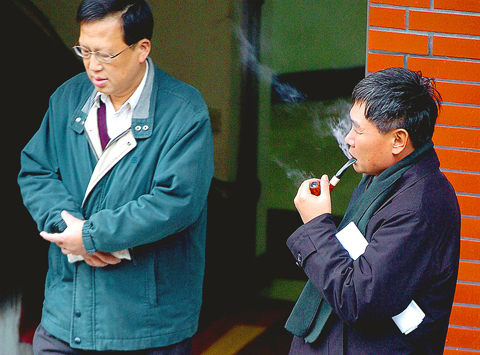On the second day since the new anti-tobacco regulation came into force, health officials yesterday continued issuing tickets to violators, mostly business owners who provided ashtrays or failed to display no-smoking signs.
As of yesterday, health officials in 25 counties and cities had inspected more than 10,760 establishments and issued more than 65 tickets for violations of the Tobacco Hazard Prevention and Control Act (菸害防制法), said Chao Kun-yu (趙坤郁), deputy director general of the Bureau of Health Promotion.
The first wave of inspections focused mainly on smoking in public places, he said. Most violations involved business owners who provided ashtrays or smoking-related paraphernalia, or who failed to display no-smoking signs that meet the requirements stipulated in the regulation.

PHOTO: LIAO CHEN-HUEI, TAIPEI TIMES
Many people, however, disputed what they saw as “gray areas” in the regulation, such as certain public outdoor areas that are “completely smoke-free” as stipulated in the regulation. Some people complained they did not know open areas outside hospitals were considered smoke-free zones, while others were confused about whether they could smoke in temples, as most temples are open spaces that are filled with smoke from burning incense.
Hsiao Mei-ling (蕭美玲), director general of the bureau, said at a press conference yesterday that smoking would be prohibited within 10m of operating facilities in public spaces that are completely off-limits to smoking, as stipulated in Article 15 of the Act. This would include areas such as hospitals, train and bus stations, school campuses, government agencies, post offices, banks, offices with three or more people, performance halls, movie theaters, hotels, shopping malls and most restaurants.
“Large shopping areas or supermarkets are off-limits [to smoking] because they qualify as indoor working areas with three or more people,” Hsiao said.
The Act “does not apply to mall shops with one or two employees, such as local shops and family-owned beauty parlors,” she said.
Temples have also escaped the various categories of smoke-free spaces listed in Articles 15 and 16 of the Act, meaning that smoking is still allowed, she said.
The bureau will issue official notices to all major hospitals and clinics to provide clarification on the new Act, as well as to the Ministry of Transportation and Communications for distribution to all transportation-related facilities.
The bureau’s interpretation of the Act drew criticism from anti-smoking group the John Tung Foundation.
Yau Sea-wain (姚思遠), president of the foundation and dean of Chinese Culture University’s College of Law, slammed the bureau for what he said was a misinterpretation of the law and ignoring the intent of the Act.
“If the space in question has different smoking regulations depending on whether the smoker is indoors or outdoors, then the law would clearly state this,” said Yau.
Smoking is prohibited at bus and train stations as well as hospitals — indoors or outdoors — as clearly stated in the Act, he said.
Small local shops and family-owned beauty parlors qualify as public spaces, as stated in Article 15 Item 13 of the Act, so it is not a question of whether three or more people work there, as the bureau stated, he said.
“Doesn’t the bureau categorize ‘temples’ as a public space? They are, as are shops and beauty parlors,” he said.
“The bureau’s hasty interpretation has weakened the carefully written law,” he said.

The brilliant blue waters, thick foliage and bucolic atmosphere on this seemingly idyllic archipelago deep in the Pacific Ocean belie the key role it now plays in a titanic geopolitical struggle. Palau is again on the front line as China, and the US and its allies prepare their forces in an intensifying contest for control over the Asia-Pacific region. The democratic nation of just 17,000 people hosts US-controlled airstrips and soon-to-be-completed radar installations that the US military describes as “critical” to monitoring vast swathes of water and airspace. It is also a key piece of the second island chain, a string of

A magnitude 5.9 earthquake that struck about 33km off the coast of Hualien City was the "main shock" in a series of quakes in the area, with aftershocks expected over the next three days, the Central Weather Administration (CWA) said yesterday. Prior to the magnitude 5.9 quake shaking most of Taiwan at 6:53pm yesterday, six other earthquakes stronger than a magnitude of 4, starting with a magnitude 5.5 quake at 6:09pm, occurred in the area. CWA Seismological Center Director Wu Chien-fu (吳健富) confirmed that the quakes were all part of the same series and that the magnitude 5.5 temblor was

The Central Weather Administration has issued a heat alert for southeastern Taiwan, warning of temperatures as high as 36°C today, while alerting some coastal areas of strong winds later in the day. Kaohsiung’s Neimen District (內門) and Pingtung County’s Neipu Township (內埔) are under an orange heat alert, which warns of temperatures as high as 36°C for three consecutive days, the CWA said, citing southwest winds. The heat would also extend to Tainan’s Nansi (楠西) and Yujing (玉井) districts, as well as Pingtung’s Gaoshu (高樹), Yanpu (鹽埔) and Majia (瑪家) townships, it said, forecasting highs of up to 36°C in those areas

IN FULL SWING: Recall drives against lawmakers in Hualien, Taoyuan and Hsinchu have reached the second-stage threshold, the campaigners said Campaigners in a recall petition against Chinese Nationalist Party (KMT) Legislator Yen Kuan-heng (顏寬恒) in Taichung yesterday said their signature target is within sight, and that they need a big push to collect about 500 more signatures from locals to reach the second-stage threshold. Recall campaigns against KMT lawmakers Johnny Chiang (江啟臣), Yang Chiung-ying (楊瓊瓔) and Lo Ting-wei (羅廷瑋) are also close to the 10 percent threshold, and campaigners are mounting a final push this week. They need about 800 signatures against Chiang and about 2,000 against Yang. Campaigners seeking to recall Lo said they had reached the threshold figure over the